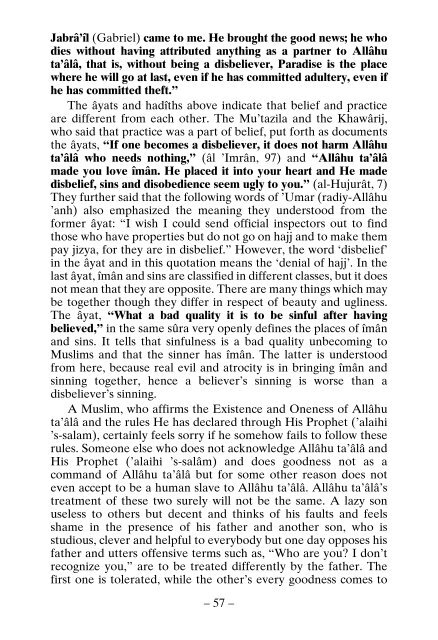Islams Reformers
The bigotry of the religion reformers or bigots of science who surfaced lately to blame all previous scholars, basic fundamental beliefs or practices
The bigotry of the religion reformers or bigots of science who surfaced lately to blame all previous scholars, basic fundamental beliefs or practices
You also want an ePaper? Increase the reach of your titles
YUMPU automatically turns print PDFs into web optimized ePapers that Google loves.
Jabrâ’îl (Gabriel) came to me. He brought the good news; he who<br />
dies without having attributed anything as a partner to Allâhu<br />
ta’âlâ, that is, without being a disbeliever, Paradise is the place<br />
where he will go at last, even if he has committed adultery, even if<br />
he has committed theft.”<br />
The âyats and hadîths above indicate that belief and practice<br />
are different from each other. The Mu’tazila and the Khawârij,<br />
who said that practice was a part of belief, put forth as documents<br />
the âyats, “If one becomes a disbeliever, it does not harm Allâhu<br />
ta’âlâ who needs nothing,” (âl ’Imrân, 97) and “Allâhu ta’âlâ<br />
made you love îmân. He placed it into your heart and He made<br />
disbelief, sins and disobedience seem ugly to you.” (al-Hujurât, 7)<br />
They further said that the following words of ’Umar (radiy-Allâhu<br />
’anh) also emphasized the meaning they understood from the<br />
former âyat: “I wish I could send official inspectors out to find<br />
those who have properties but do not go on hajj and to make them<br />
pay jizya, for they are in disbelief.” However, the word ‘disbelief’<br />
in the âyat and in this quotation means the ‘denial of hajj’. In the<br />
last âyat, îmân and sins are classified in different classes, but it does<br />
not mean that they are opposite. There are many things which may<br />
be together though they differ in respect of beauty and ugliness.<br />
The âyat, “What a bad quality it is to be sinful after having<br />
believed,” in the same sûra very openly defines the places of îmân<br />
and sins. It tells that sinfulness is a bad quality unbecoming to<br />
Muslims and that the sinner has îmân. The latter is understood<br />
from here, because real evil and atrocity is in bringing îmân and<br />
sinning together, hence a believer’s sinning is worse than a<br />
disbeliever’s sinning.<br />
A Muslim, who affirms the Existence and Oneness of Allâhu<br />
ta’âlâ and the rules He has declared through His Prophet (’alaihi<br />
’s-salam), certainly feels sorry if he somehow fails to follow these<br />
rules. Someone else who does not acknowledge Allâhu ta’âlâ and<br />
His Prophet (’alaihi ’s-salâm) and does goodness not as a<br />
command of Allâhu ta’âlâ but for some other reason does not<br />
even accept to be a human slave to Allâhu ta’âlâ. Allâhu ta’âlâ’s<br />
treatment of these two surely will not be the same. A lazy son<br />
useless to others but decent and thinks of his faults and feels<br />
shame in the presence of his father and another son, who is<br />
studious, clever and helpful to everybody but one day opposes his<br />
father and utters offensive terms such as, “Who are you? I don’t<br />
recognize you,” are to be treated differently by the father. The<br />
first one is tolerated, while the other’s every goodness comes to<br />
– 57 –

















